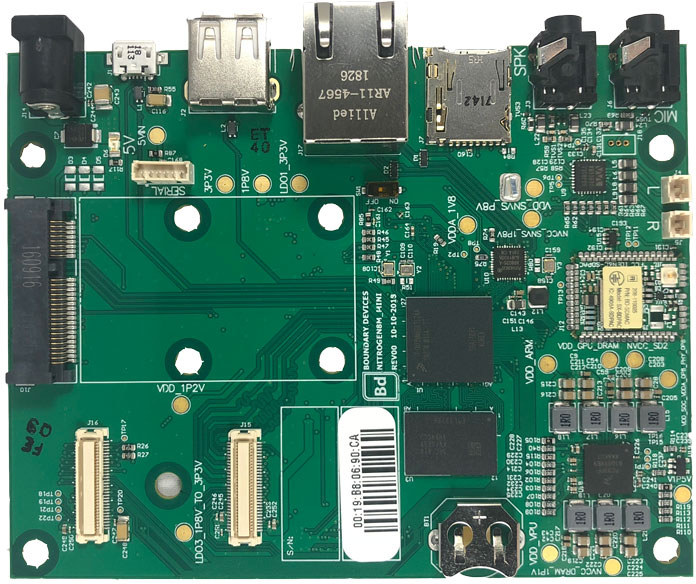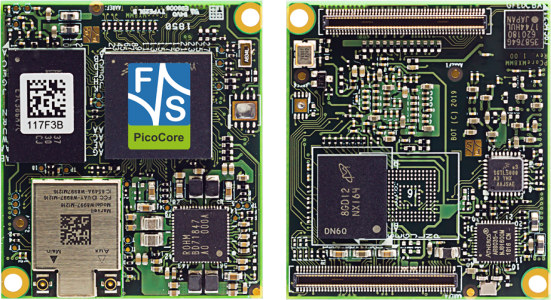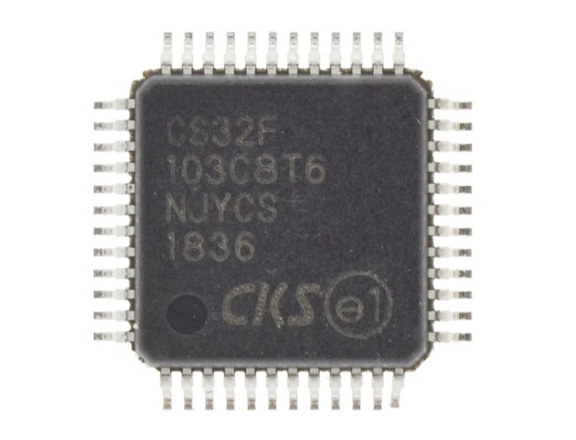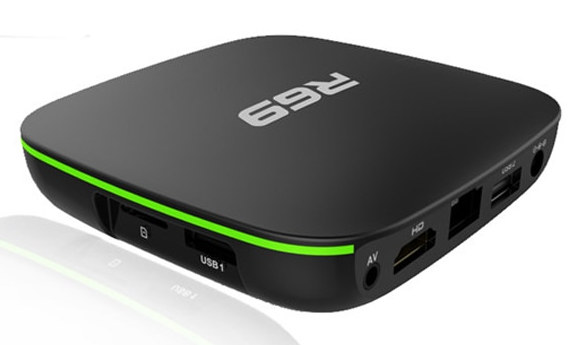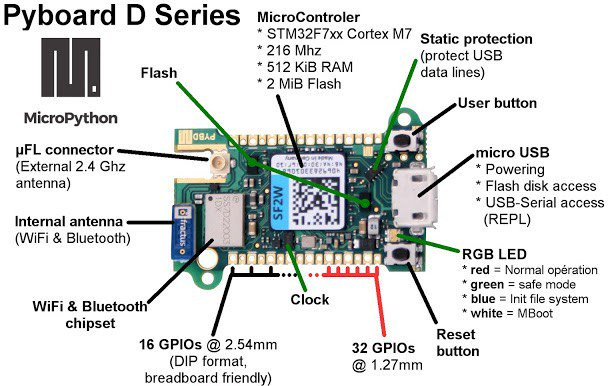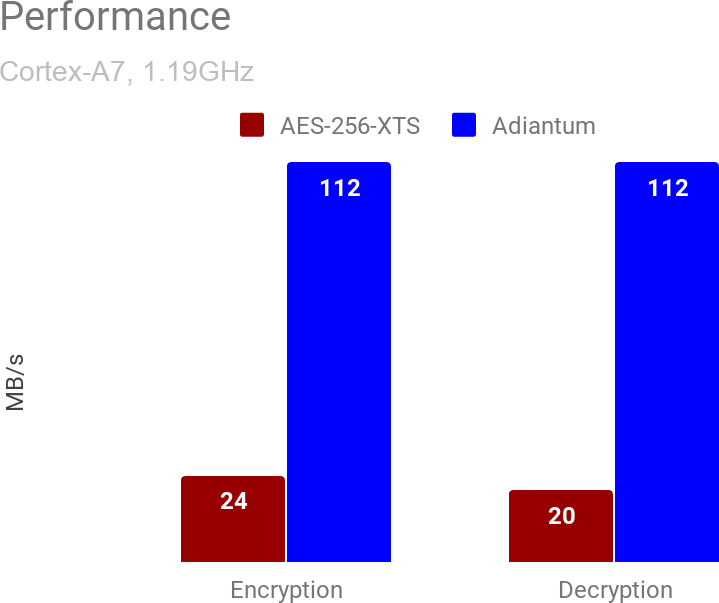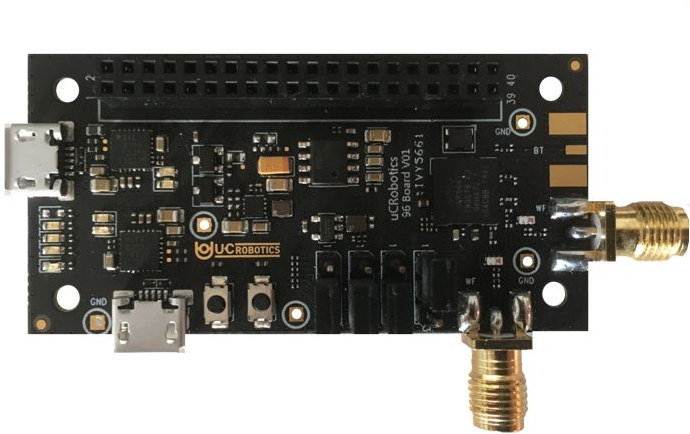Having just written about one of the first NXP i.MX 8M Mini systems-on-module, let’s stay with NXP’s latest 14-nm processor as Boundary Devices have been working on a variant of their Nitrogen8M SBC based on MXP i.MX 8M Mini processor and aptly called Nitrogen8M_Mini. The board is also known as the less human-friendly Nit8MQ_Mini_2r8e SBC, and comes with the following specifications: SoC – NXP i.MX 8M Mini with 4x Cortex A53 cores, 1x Cortex-M4F real-time core, Vivante GCNanoUltra 3D GPU, Vivante GC320 2D GPU System Memory – 2GB LPDDR4 (Optional 4GB version) Storage – 8GB eMMC flash, expandable up to 128GB, UHS SD card slot Display – 4-lane MIPI DSI interface up to 1080p Video Encode / Decode – 1080p H.264, VP8/1080p60 H.265, H.264, VP8, VP9 Audio – 3.5mm headphone jack, analog MIC jack, 2W audio amplifier, L&R speaker headers Camera Interface – 1x 4-lane MIPI-CSI interface Connectivity Gigabit Ethernet […]
F&S Elektronik PicoCore MX8MM System-on-Module Features NXP i.MX 8M Mini Processor
Embedded World 2019 will take place at the end of this month on February 26-28 in Nuremberg, Germany, and we can expect plenty of news related to embedded systems. It’s very likely NXP i.MX 8M Mini processor will officially be launched, and we’ll see several modules and boards announced with the lower cost 14-nm processor. F&S Elektronik Systeme has already been promoting their upcoming PicoCore MX8MM system-on-module based on NXP i.MX 8M in their newsletter ahead of Embedded World, where they’ll showcase their solutions at booth 621 in hall 2. PicoCore MX8MM specifications: SoC – NXP i.MX 8M Mini single, dual, quad core Arm Cortex-A53 @ 1.8 GHz processor, Cortex-M4 real-time core @ 400 MHz, 512KB L2-Cache, 2D/3D GPU System Memory – Up to 8GB LPDDR4 Storage – Up to 512MB SLC NAND flash or up to 32GB eMMC flash Video Decode – 1080p60 HEVC H.265, VP9, H.264, VP8 Connectivity 802.11ac […]
CS32 MCU Clone of STM32 Makes it into Bluepill Board
A few year ago, we covered GigaDevice GD32 MCU based on STM32 Arm Cortex-M3 microcontroller, but with some improvements to the flash and overall performance. So the MCU is not exactly an STM32 clone per se, but it’s pin-to-pin and software compatible. Now based on a discussion on STM32duino forum, it looks like another company (CKS – 中科芯微) may have made an actual clone of STM32 with CS32, more exactly CS32F103 that is compatible with STM32F103. CS32 comes with an Arm Cortex-M3 core clocked at 72 MHz, 64 to 128KB flash, and 20 KB RAM. A datasheet and user manual are available but only in Chinese. Several STM32duino members suspect it’s an actual copy of STM32 without modifications. What’s unclear is whether it’s a pirated copy, or a properly licensed one. CS32F103C8T6 & CS32F103CBT6 parts can be purchased on Aliexpress for $0.80 shipped and up. The datasheet mentions 64KB or […]
Wechip R69 Allwinner H3 TV Box goes for $19 Shipped
A few years ago, it was relatively easy to purchase sub $20 TV boxes with some patience, but with the increase in RAM and flash prices, it’s been more difficult to find those ultra-cheap TV boxes. It turns out there’s such a deal now on Aliexpress where Wechip R69 TV box is sold for just $18.99 shipped. Now with an Allwinner H3 processor, 1GB RAM, and 8GB flash, I would not necessarily recommend such device for your media needs, but they can be useful for some specific use cases like a simple digital signage, or even to run Linux with some efforts. Wechip R69 also looks to be similar to Sunvell R69 TV box that is officially supported by RetroOrangePi, but with the pin-to-pin compatible Allwinner H2 processor, so it could make an inexpensive retro gaming console as well. Wechip R69 specifications: SoC – Allwinner H3 quad-core Cortex A7 processor […]
Pyboard D Series MicroPython Board Features STM32F7 MCU, WiFi and Bluetooth
Micropython is a lightweight implementation of Python for microcontroller which we covered first in 2013. The port is supported by various hardware platforms, and I even tested Micropython on ESP32 a little while ago, but the developer – Damien George – also launched officially supported boards starting with Pyboard in 2014 with an STM32F4 microcontroller. At FOSDEM 2019, the upcoming Pyboard D-series (aka Pyboard D, or just PyBD) board was introduced during the Micropython presentation with a faster STM32F7 Cortex-M7 MCU, as well as built-in WiFi and Bluetooth connectivity. Pyboard D preliminary specifications: MCU – STMicro STM32F7xx Arm Cortex M7 microcontroller at 216 MHz with 512KB RAM, 2MB flash Storage – micro SD card slot, and 2x external flash chips Connectivity – WiFi & Bluetooth with on-board antenna and u.FL antenna connector USB – 1x micro USB port for power, flash disk access, and USB to serial debugging/programming Expansion 2.54mm […]
Adiantum Enables Faster File Encryption in Devices without AES Crypto Accelerator
File Encryption is enabled – even required – by default in most Android devices, as it protects your data would you lose your phone, or have it stolen. Encryption in Android leverages the Advanced Encryption Standard (AES), and most modern 64-bit processors – like the ones based on Armv8 – come with a crypto accelerator that boosts performance several folds compared to a software only solution. But there are also many low end devices, for example based on Arm Cortex-A7, that lack crypto extensions, and enabling AES encryption would make the devices even slower than they already are. So in order to provide file encryption on entry-level hardware without comprising too much on performance, Google has developed Adiantum encryption optimized to run on targets without crypto accelerator. As explained in a Google Security blog post, Adiantum uses the ChaCha stream cipher – as used in HTTPS – in a length-preserving […]
Qualcomm Snapdragon 712 is an Incremental Upgrade to Snapdragon 710 Processor
Last year, Qualcomm unveiled the Snapdragon 710 processor aiming to bring faster A.I. processing to mid-range smartphone with double the AI performance compared to Snapdragon 660. The company has now introduced an upgrade to the processor with Snapdragon 712 that delivers better battery management, auto-adjust settings for pictures, and improved understanding of voice cues. Qualcomm Snapdragon 712 mobile platform (SDM712) specifications with hightlights in bold showing differences against Snapdragon 710: CPU – 8x Qualcomm Kryo 360 CPU @ up to 2.3 GHz (in two clusters) GPU – Qualcomm Adreno 616 Visual Processing Subsystem supporting OpenGL ES 3.2, OpenCL 2.0, Vulkan, DirectX 12 DSP – Qualcomm Hexagon 685 DSP with 3rd Gen Qualcomm Hexagon Vector Extensions (HVX), Qualcomm All-Ways Aware Sensor Hub Memory I/F – LPDDR4x, 2x 16-bit up to 1866MHz, 8GB RAM Storage I/F – No info provided Display – Up to Quad HD+ Video Up to 4K Ultra HD […]
Ivy5661 Bluetooth 5 + 802.11ac WiFi IoT Board Up for Pre-order for $35
There are many WiFi and/or Bluetooth board designed for the Internet of Things thanks to ESP8266 / ESP32, and other solutions, but usually they all work in the 2.4 GHz frequency band which can be an issue in crowded environments. Last October, we covered ucRobotics Ivy5661 96Boards compliant IoT board that offers a dual core Arm Cortex-M4F MCU with 802.11ac WiFi 5 and Bluetooth 5 connectivity. It was still under development at the time, but today, I’ve noticed it was listed on Seeed Studio for $35 with shipping scheduled for the end of February. ucRobotics Ivy5661 board specifications: SoC – UniSoC UWP5661 dual core Arm Cortex-M4 microcontroller @ 416 MHz manufactured with 28nm process Storage – 32Mbit NOR flash Connectivity (built in SoC) Dual band 802.11ac 2×2 MIMO WiFi 5 up to 866MHz; supports repeater mode, RTT indoor positioning Bluetooth 5 with support for high power mode, BT mesh, and […]


